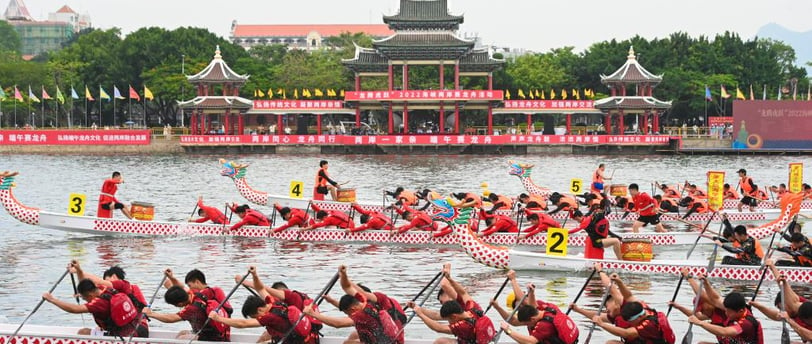Free Delivery on orders over US$200
Celebrating Duanwu Festival in China
The Dragon Boat Festival, also known as Duanwu Festival, is a traditional Chinese festival celebrated on the fifth day of the fifth month of the lunar calendar. With a history spanning over two thousand years, this festival encompasses several key traditions and activities
THE 24 SOLAR TERMS
5/29/20243 min read


Historical and Cultural Significance of Duanwu Festival
The Duanwu Festival, also known as the Dragon Boat Festival, boasts a rich history spanning over two millennia. Its origins are intricately tied to the legend of Qu Yuan, a patriotic poet and minister who lived during the Warring States period. Qu Yuan's unwavering loyalty to his state, Chu, led him to protest against corruption and advocate for reforms, which ultimately resulted in his exile. In a tragic turn of events, upon learning of Chu's defeat, Qu Yuan ended his life by drowning himself in the Miluo River. The local people, mourning his loss, raced their boats to retrieve his body and offer rice dumplings to appease his spirit, thus giving rise to the festival's enduring traditions.
Over the centuries, the Duanwu Festival has evolved, yet it remains deeply rooted in Chinese culture. The festival is marked by various customs, including the preparation and consumption of zongzi, glutinous rice wrapped in bamboo leaves, and the exhilarating dragon boat races. These activities not only commemorate Qu Yuan's sacrifice but also serve as a means to ward off evil spirits and diseases, a belief that has persisted since ancient times.
The cultural significance of the Duanwu Festival extends beyond mere historical commemoration. It embodies themes of patriotism, loyalty, and the collective spirit of the community. Recognized as a public holiday in China, the festival provides an opportunity for families to gather, honoring their heritage and fostering a sense of unity. Furthermore, the influence of the Duanwu Festival can be observed in other East Asian cultures, such as in Taiwan, Hong Kong, and even among the Chinese diaspora worldwide, where similar customs and celebrations are held.
In modern times, the Duanwu Festival continues to adapt, integrating contemporary elements while preserving its traditional essence. Events such as dragon boat races have gained international popularity, attracting participants and spectators from around the globe. This blend of old and new ensures that the Duanwu Festival remains a vibrant and integral part of Chinese cultural identity, celebrating both historical legacy and modern-day communal bonds.
Traditional Activities and Customs of Duanwu Festival
The Duanwu Festival, often referred to as the Dragon Boat Festival, is rich in traditional activities and customs that have been passed down through generations. One of the most iconic events during this festival is the dragon boat races. These races are not merely a test of speed and endurance but also a display of community spirit and cultural heritage. The boats, often ornately decorated with dragon heads and tails, are powered by teams of paddlers who synchronize their strokes to the beat of a drum. Historically, these races are believed to commemorate the search for the body of the revered poet Qu Yuan, who is said to have drowned himself in protest against political corruption.
Another central tradition of the Duanwu Festival is the preparation and consumption of zongzi. These pyramid-shaped dumplings are made of glutinous rice stuffed with various fillings such as red bean paste, dates, or meat, and wrapped in bamboo leaves. The practice of making zongzi also traces back to the legend of Qu Yuan, with locals throwing similar rice dumplings into the river to prevent fish from consuming his body. Today, zongzi remains a beloved culinary highlight of the festival, symbolizing respect and remembrance.
In addition to these well-known customs, other activities are equally significant in the celebration of the Duanwu Festival. Hanging calamus and mugwort plants at the doors of homes is a common practice believed to ward off evil spirits and diseases. These aromatic plants are not only symbolic but also serve practical purposes due to their insect-repellent properties. Furthermore, wearing perfume pouches filled with fragrant herbs is another tradition aimed at protecting against illnesses and bringing good fortune.
The consumption of realgar wine is yet another unique aspect of the festival. This traditional alcoholic beverage, often infused with realgar, a type of arsenic sulfide mineral, is believed to have medicinal properties that can prevent diseases and expel toxins. Drinking realgar wine has historical roots in ancient Chinese medicine and remains a ceremonial act during the festivities.
Together, these customs and activities paint a vivid picture of the Duanwu Festival, showcasing a blend of cultural heritage, historical significance, and communal spirit. Through these practices, the festival not only pays homage to ancient traditions but also fosters a sense of unity and collective identity among those who celebrate it.
